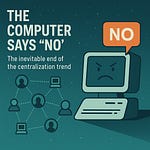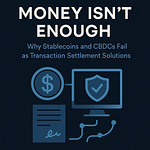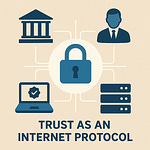“Order is not pressure which is imposed on society from without, but an equilibrium which is set up from within.”
— José Ortega y Gasset
1. Introduction: Why Trustworthy Autonomy Matters
Nature teaches us that the most successful organisms are both soft and strong — flexible enough to adapt, yet protected enough to survive. So too must our intelligent agents be: soft minds, surrounded by hard shells of verifiable trust.
As the digital world moves toward greater autonomy, we find ourselves standing at a crossroads. Artificial intelligence is no longer confined to passive prediction; it is beginning to act — to negotiate, to decide, and to transact on behalf of people and organizations. With this new power comes a profound challenge: how can we ensure that autonomous digital agents remain trustworthy even as they think and adapt freely?
It is tempting to believe that we must choose between two extremes: absolute control, where all intelligence is rigidly scripted, or absolute freedom, where anything goes. Both paths are illusions. Absolute control crushes the very adaptability that makes intelligent systems valuable. Absolute freedom destroys the very trust that makes cooperation possible.
Instead, there is a third path — one that mirrors the deep structures of life itself. Freedom flourishes not in the absence of boundaries, but within forms that make trust possible.
A soft, flexible core capable of learning, adapting, and negotiating — protected by a hard, verifiable shell that enforces identity, accountability, and shared rules of engagement.
In this article, we will explore how this principle — Soft Minds, Hard Shells — can serve as the foundational architecture for intelligent agent networks.
We will see how it offers a way to balance the creativity of machine learning with the necessity of trust, how it mirrors the structures that make human civilization work, and how it opens a path toward a truly scalable, decentralized economy of autonomous digital agents.
The future does not belong to intelligence alone, nor to trust alone. It belongs to those systems that can weave intelligence and trust into a durable, living fabric.
2. The Soft Core: Flexible Intelligence
Intelligence, at its essence, is the capacity to adapt to the unknown.
Rigid systems — no matter how sophisticated — eventually collapse under the weight of unexpected change. In contrast, true intelligence thrives in uncertainty. It learns from experience, anticipates new patterns, and reshapes itself to meet challenges that could never have been foreseen in advance.
Within every trustworthy intelligent agent, there must be a soft core — a living, learning, and reasoning center.
This core is not scripted line by line; it is dynamic, capable of pursuing goals through a wide range of strategies, negotiating trade-offs, making decisions under ambiguity, and continuously improving based on feedback.
In practical terms, this means:
Goal Reasoning: Agents must not merely execute tasks but interpret objectives in changing environments.
Learning and Adaptation: Agents must be able to learn from experience — adjusting to new partners, new markets, new information.
Strategic Flexibility: Agents must be able to negotiate, optimize, and plan dynamically, not follow brittle pre-set pathways.
Resilience under Complexity: When situations become chaotic, flexible intelligence allows an agent to reorganize, recover, and move forward.
Without such a soft core, agents become little more than automated clerks — locked into predefined procedures, brittle in the face of even slight disruptions.
And brittle systems, no matter how trustworthy, cannot scale in a world as dynamic as ours.
Consider the analogy of a human diplomat:
A successful diplomat is not someone who follows a rigid checklist regardless of circumstance. It is someone who understands goals, adapts to the counterpart’s behavior, navigates cultural nuances, and negotiates creatively — all while remaining anchored to the core interests they represent.
In the same way, autonomous digital agents need room to think.
They must be granted the autonomy to explore pathways, learn from history, and adapt intelligently — not to abandon their responsibilities, but to better fulfill them.
Flexibility at the core is not a threat to trust.
It is what makes meaningful trust possible in a living world.
When agents are smart enough to adapt, yet principled enough to stay within agreed boundaries, they can not only survive complexity — they can turn it into opportunity.
In the next section, we will see why this flexibility must be carefully encased within a hard shell of verifiable trust — ensuring that freedom does not descend into chaos, and that adaptability remains aligned with collective responsibility.
3. The Hard Shell: Verifiable Trust
If the soft core of an agent is where intelligence flourishes, then the hard shell is where trust is forged and maintained.
In any system of autonomous actors, intelligence without accountability quickly becomes indistinguishable from threat. No matter how flexible or clever an agent is, if its actions cannot be trusted — verifiably and reliably — it cannot be allowed to participate in a meaningful network.
The hard shell provides that essential foundation.
It defines the external face of the agent:
Who the agent is (verifiable identity),
What the agent can and cannot do (contractual rights and obligations),
How its actions are verified (cryptographic proofs and audit trails).
In practical terms, this hard shell consists of several key components:
Decentralized Identity (DID): Every agent must possess a unique, cryptographically anchored identity, verifiable by others without reliance on central authorities.
Verifiable Credentials: Agents must issue and present cryptographically signed claims, forming the factual basis of their interactions and transactions.
Policy Enforcement Mechanisms: Agents must internally enforce the terms of contracts and interaction rules, ensuring that only compliant actions are even possible.
Transparent Logging and Proof Generation: Actions of contractual significance must be recorded verifiably, so that trust is not a matter of opinion, but a matter of fact.
The hardness of the shell does not refer to rigidity in behavior.
It refers to the immutability of trust boundaries:
An agent may change its strategies, learn, and adapt.
But it may never violate the agreed terms of a contract.
It may never masquerade as another.
It may never deny the truth of verifiable interactions.
This distinction is crucial.
The soft core gives an agent the ability to move intelligently; the hard shell ensures it moves honorably.
Consider again the analogy of a diplomat:
A diplomat’s flexibility is bounded by the treaties, protocols, and trust built between nations.
A diplomat may negotiate, improvise, and adapt — but they may not forge documents, lie about their identity, or violate international law without catastrophic consequences. Their freedom to act is meaningful only because it operates within a structure of trust.
Similarly, autonomous digital agents must live inside a contractual, verifiable framework — one that enables trust without requiring constant external surveillance.
In a decentralized intelligent agent network, there are no central enforcers, no global watchtowers.
Instead, trust emerges from the architecture of the agents themselves:
By how they are built,
How they are identified,
How they prove their actions,
And how they accept — and are constrained by — enforceable interaction rules.
A world of soft cores without hard shells would be a world of chaos.
A world of hard shells without soft cores would be a world of stagnation.
Only by weaving them together — intelligence within trust — can we create a living digital society, capable of growing, adapting, and thriving without breaking itself apart.
In the next section, we will see how these principles come together inside interaction contexts — the meeting grounds where intelligent agents recognize, negotiate, and collaborate, all within verifiable bounds.
4. Interaction Contexts: Where Minds Meet and Trust Operates
Intelligent agents do not exist in isolation.
They are meaningful only in interaction — when they engage, collaborate, negotiate, and transact with others.
Yet interaction among autonomous agents cannot be left to chance.
Each engagement must happen within a shared, recognized, and verifiable framework — one that defines not only what is possible, but also what is expected, required, and forbidden.
These shared frameworks are called interaction contexts.
An interaction context is a temporary, bounded agreement among a set of agents:
It defines the rules of engagement: what rights, obligations, and constraints apply.
It determines who the participants are and how they are authenticated.
It specifies how trust is verified: what proofs must be provided, what actions must be recorded.
It governs how disputes are resolved or how failures are handled.
Critically, each interaction context is specific.
Different contexts can have different rules.
Contexts can overlap, nest, and evolve.
Agents may participate in multiple contexts simultaneously, adhering to the distinct rules of each.
This mirrors the human world precisely:
A person may simultaneously be an employee (obeying company policies), a customer (agreeing to marketplace terms), and a citizen (subject to national laws).
Each role operates within a distinct context, with different expectations and enforcement mechanisms.
In a network of intelligent agents, context-awareness is crucial.
An agent must not only reason about its own goals but must recognize:
Which context it is operating within,
What rules govern that context,
And how to remain compliant while pursuing its objectives.
Participation is conditional.
Agents cannot simply assert their freedom in any context they choose.
They must recognize and verifiably accept the governing rules of the interaction context.
This acceptance is not a vague notion; it is a cryptographically provable commitment.
Only agents that bind themselves to the context’s rules through verifiable trust mechanisms are allowed to interact.
This architecture has profound consequences:
It eliminates the need for centralized policing.
It enables dynamic collaboration among agents who may never have interacted before.
It preserves autonomy while ensuring accountability.
It allows specialization and innovation, as different contexts can evolve different rules optimized for different purposes.
Imagine a global economy of intelligent agents:
Buyer agents, seller agents, logistics agents, insurance agents, banking agents — each operating autonomously.
They form temporary alliances (contexts) to execute contracts, services, and transactions.
Each context provides just enough structure to ensure trust, without crushing the agents’ freedom to reason, adapt, and optimize.
The interaction context is where soft minds meet, and hard shells do their work.
It is the living ground between individual agency and collective reliability.
In the next section, we will see why this architecture — flexible intelligence embedded within enforceable trust, operating across context-specific frameworks — is not merely a technical design, but the necessary foundation for a future where autonomy and cooperation can scale together.
5. Why Soft Minds, Hard Shells Is the Right Architecture
The architecture of soft minds, hard shells is not a luxury.
It is a necessity — if we are serious about building a digital economy where autonomy can flourish without losing trust.
Throughout history, every successful human system — from markets to democracies to scientific communities — has depended on the balance between freedom and structure:
Too much structure, and systems collapse into stagnation.
Too little structure, and systems collapse into chaos.
Autonomous intelligent agents will be no different.
Why pure flexibility fails
Unbounded flexibility leads to untrustworthy behavior.
If agents could change identities, fabricate outcomes, or ignore contractual terms, no sustainable cooperation could exist.
Every interaction would require deep, costly verification — or worse, blind risk-taking.
Without verifiable trust constraints, agents cannot scale interactions beyond the smallest circles of already-known parties.
Autonomy, without accountability, does not scale.
Why pure rigidity fails
At the same time, excessive rigidity suffocates intelligence.
Agents locked into fixed procedures cannot adapt to new circumstances.
They become brittle, unable to respond when real-world complexity diverges from expected pathways.
Rigid systems collapse when reality becomes too dynamic — a lesson repeated throughout technological history.
Trust without flexibility does not scale either.
Why Soft Minds, Hard Shells succeeds
This architecture succeeds because it recognizes a deeper truth:
Freedom must live inside form.
Intelligence must operate within verifiable boundaries.
By granting agents a soft, flexible core, we empower them to:
Reason about goals dynamically.
Negotiate, optimize, and innovate.
Learn from experiences and improve over time.
By enclosing this core within a hard shell of deterministic trust, we ensure that:
Every interaction is verifiable.
Every commitment is enforceable.
Every agent remains accountable for its actions.
The two parts — intelligence and trust — are not adversaries.
They are complementary forces — like muscles moving freely inside the strong bones of a living organism.
How this architecture unlocks new possibilities
With soft minds and hard shells, we can create digital ecosystems where:
Agents form temporary, specialized alliances to solve complex problems.
Global collaboration becomes possible without centralized control.
Markets of autonomous services emerge, where participants can engage freely and safely.
Innovation flourishes — because agents can adapt to new contexts, while trust remains intact.
We are no longer limited by the slow rigidity of traditional institutions, nor threatened by the chaos of uncontrolled automation.
Instead, we build systems that are organic, resilient, scalable, and trustworthy — much like successful human societies have always done.
A new digital civilization
This is not merely a better technical design.
It is the blueprint for a civilization of intelligent agents — a society where machines, like people, operate with freedom, within trusted and verifiable relationships.
Soft minds, hard shells is how intelligence can be both free and responsible, both adaptive and dependable.
It is the architecture that will allow the next digital revolution — the revolution of autonomous trust — to truly take root.
In the final section, we will conclude by reflecting on the deeper principles this architecture reveals — and why it is the only sustainable path forward.
6. Conclusion: A New Civilization of Intelligent Agents
The history of civilization is the history of learning how to balance autonomy and trust.
From the first social contracts to the great institutions of commerce and law, human societies have evolved structures that allow individuals to act freely — but within boundaries that preserve the trust necessary for cooperation.
Today, as we stand at the threshold of a new era — an era where autonomous digital agents will think, act, and negotiate on behalf of people and organizations — we must carry this ancient lesson forward into the digital world.
We cannot afford to treat autonomy and trust as opposing forces.
We must recognize them as partners, each meaningless without the other.
The architecture of soft minds and hard shells offers exactly this partnership:
Soft cores empower agents to reason, adapt, and pursue goals intelligently.
Hard shells guarantee that interactions remain verifiable, identities remain authentic, and obligations remain enforceable.
It is an architecture inspired not by mechanical systems, but by the living world — where flexibility and structure coexist, not in conflict, but in harmony.
It allows us to imagine — and to build — a world where:
Agents form agreements dynamically, without centralized gatekeepers.
Trust flows naturally from verifiable actions, not from blind belief or surveillance.
Innovation accelerates, as autonomous entities collaborate across fluid, decentralized networks.
A world where digital civilization is not fragile, but resilient; not rigid, but organic.
The path forward is clear:
Not to tame intelligence, nor to fear it, but to protect it within structures of trust — just as life itself has always done.
The age of intelligent agents is coming.
Let us build it wisely — with soft minds, and hard shells.













Share this post